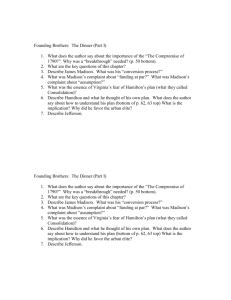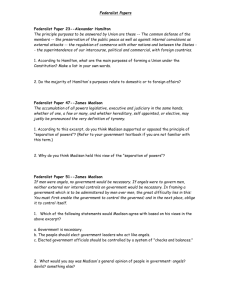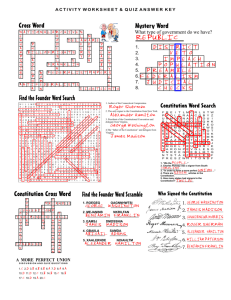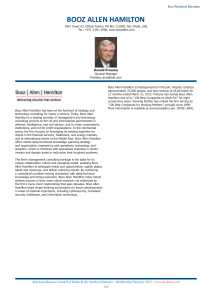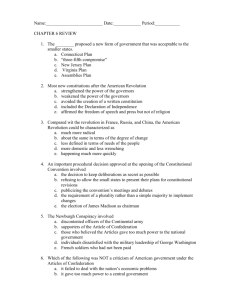study guides - Cornell College
advertisement
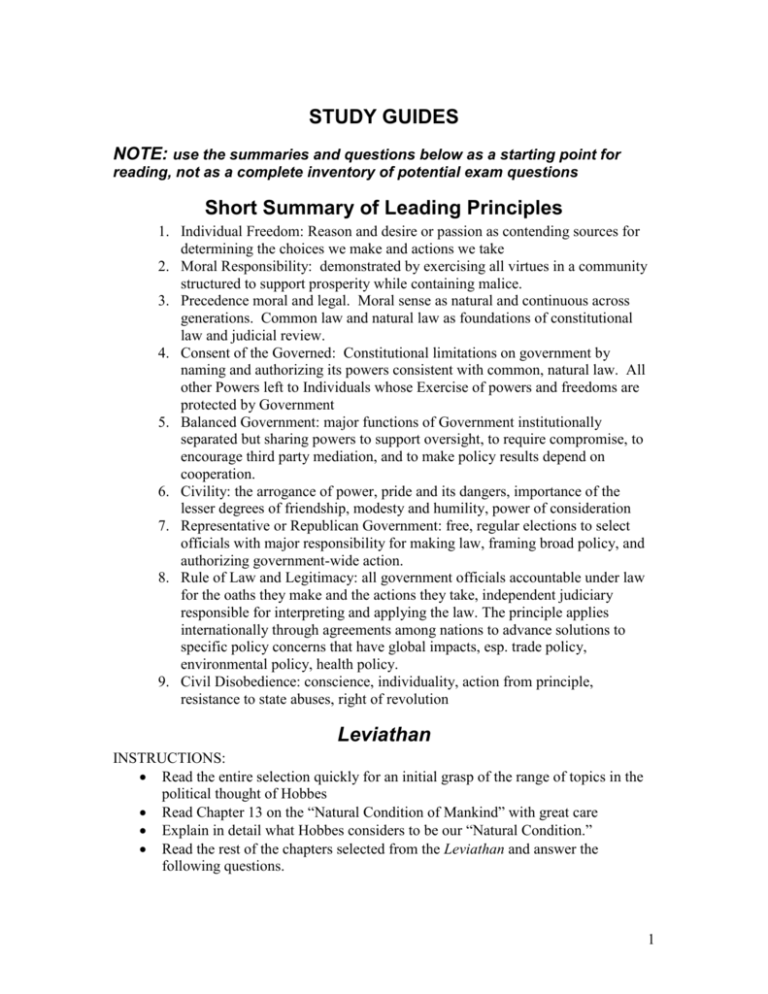
STUDY GUIDES NOTE: use the summaries and questions below as a starting point for reading, not as a complete inventory of potential exam questions Short Summary of Leading Principles 1. Individual Freedom: Reason and desire or passion as contending sources for determining the choices we make and actions we take 2. Moral Responsibility: demonstrated by exercising all virtues in a community structured to support prosperity while containing malice. 3. Precedence moral and legal. Moral sense as natural and continuous across generations. Common law and natural law as foundations of constitutional law and judicial review. 4. Consent of the Governed: Constitutional limitations on government by naming and authorizing its powers consistent with common, natural law. All other Powers left to Individuals whose Exercise of powers and freedoms are protected by Government 5. Balanced Government: major functions of Government institutionally separated but sharing powers to support oversight, to require compromise, to encourage third party mediation, and to make policy results depend on cooperation. 6. Civility: the arrogance of power, pride and its dangers, importance of the lesser degrees of friendship, modesty and humility, power of consideration 7. Representative or Republican Government: free, regular elections to select officials with major responsibility for making law, framing broad policy, and authorizing government-wide action. 8. Rule of Law and Legitimacy: all government officials accountable under law for the oaths they make and the actions they take, independent judiciary responsible for interpreting and applying the law. The principle applies internationally through agreements among nations to advance solutions to specific policy concerns that have global impacts, esp. trade policy, environmental policy, health policy. 9. Civil Disobedience: conscience, individuality, action from principle, resistance to state abuses, right of revolution Leviathan INSTRUCTIONS: Read the entire selection quickly for an initial grasp of the range of topics in the political thought of Hobbes Read Chapter 13 on the “Natural Condition of Mankind” with great care Explain in detail what Hobbes considers to be our “Natural Condition.” Read the rest of the chapters selected from the Leviathan and answer the following questions. 1 1. How are reason and desire related to one another, according to Hobbes? Which has priority in directing our actions? 2. For what end is a commonwealth created and how is power distributed to assure gaining it? 3. What liberty remains to subjects? With the Leviathan as your primary resource, outline the main principles of authoritarian government with specific reference to the first three leading principles. Laws of . . . Polity (1598) INSTRUCTIONS: Review discussion of the relativistic fallacy and be able to explain how Hobbes contradicts himself in the Leviathan. Long sentences and syntax that imitates Latin distinguish Hooker’s high, classical, Elizabethan writing style from Hobbes’s later, more simplified English prose. Be patient with the Laws. Read it with care and it will reward you remarkably. See help sheet attached to e-mail message sent out to all class members January 10th. 1. What distinguishes human beings from angels and how are both related to the rest of the hierarchy of nature? 2. What liberty underlies Hooker’s understanding of human nature and how is it related to such following key terms as choice, will, and appetite or desire? 3. What role does reason play in choice and how does Hooker explain the choice of evil over good. 4. How does reason depend on nature in guiding well our choices. How is law initially defined and what does it contribute to helping us make better choices? 5. What pursuit ensures our happiness and why are laws politics essential to it. 6. Why is the law more likely to be obeyed than a person? What distinguishes the rule of law from a “mere tyranny?” 7. What is the “Law of nations” and why is it important? 8. What leading principles are especially well developed by Hooker? Features of English Constitutionalism Volumes have been written on each of the major turning points in the development of English Constitutionalism and time spent by students exploring any one of them will be repaid over and over again in further historical, literary, and philosophical studies in varied departments of the College. All that will be expected in this course, however, is a mastery of the basic names, terms, dates, events, etc. outlined here for the period from Magna Carta to the even of American independence. Issue of the Day: House Reform Congressman Leach, “The Cost of Campaigns,” Des Moines Register April 6, 1997 1. How is the “game of politics played” with campaign contributions? 2. What is the long-term effect of the rising cost of campaigns? 3. What proposals are mentioned that would begin to address the problem? 2 4. Why does it face such intense resistance? David Rogers, “House Republicans Vow to Enact Tougher Ethics, Lobbying Rules.” WSJ, January 9, 2006, p. A4. 1. What misconduct concerns link new GOP House leadership with tougher rules? 2. Who is the current GOP Majority Leader and how likely is he to continue if reform concerns grow? 3. What other candidates seem likely to become contenders and how credible are they when speaking about reform. 4. What kind of reforms do GOP House members have in mind when they consider making changes? Second Treatise of Government Locke quotes Hooker often and to important effect, but the two writers are very different in what they produced. Locke’s treatise is a rough and unfinished draft that never achieved finished form. Key passages are repeated in various parts of the draft and can be overlooked without causing confusion. The length of the assignment is thus not a good indicator of the time needed to master the main ideas in it. 1. What does Locke attempt to demonstrate by his long quotation from Hooker’s Laws in Sect. 5? 2. What is the main difference observed by Locke between the state of nature and a commonwealth or civil government? (for a simple summary see Sect. 87) 3. How does Locke’s explanation of the difference compare with Hobbes’s? 4. How important is Hooker’s discussion of the end and purpose of government, quoted by Locke in Sect. 15, to Locke’s argument on the circumstances that lead to civil government (See Sec. 87 & 124)? 5. Why have scholars long regarded Locke’s discussion of “beasts of prey” in Sect. 16 as the key to the difference between Locke/Hooker and Hobbes? 6. What similarity in discussing the state of war ties Hobbes and Locke together but how do they differ on slavery and absolute, arbitrary power? Compare Locke, Sec. 19 with Hobbes, Chap. 13. 7. What is the “executive power of the law of nature” and why is it important to Locke’s discussion of how political or civil society developed? See Secs. 9-13 8. Why is property so important to Locke, not only for the reasons he gives (be specific about them) but also for reasons derived from Hooker? See Hooker, p. 5 and Locke, Sec. 26-30, 87, 124 9. What is the principle upon which Locke founds legislative power? What precedents does Locke invoke to support his discussion of such power? Sec. 9598, 134. To what extent is it supreme? Secs 135-141 10. Upon what principle does Locke establish a basic separation of powers? What evidence of checks and balances is there? Secs 145-156? 11. What link ties Locke’s discussion of tyranny to his earlier discussion of the states of slavery and war? 12. To what extent is Locke’s discussion of a right to revolution and resistance little more than a restatement of leading ideas in his opening chapters? 13. What leading principles are especially well developed by Locke? 3 Opening Statements by Senators Durbin & Brownback 1. What reasons does Sen. Durbin give for considering this nomination to be so important? What does he consider to be the right “test” for approval? 2. What are the main areas of concern for Sen. Durbin and what is the challenge that he considers Judge Alito to be facing? 3. What contention over the role of judges does Sen. Brownback consider and how does he stand on its central issue? 4. How does he apply his position to the question of representing “philosophies” on the Supreme Court? 5. What “political debates” and “exercises of power” have been taken on by the Supreme Court and why does Sen. Brownback consider it regrettable? Federalist #s 78-81 – Hamilton on the Judiciary 1. In which paragraphs and what papers does Hamilton explain and justify the doctrine of judicial review? 2. How does he reassure those who fear the doctrine 3. What features of the judiciary does Hamilton emphasize and why? 4. What fields of federal jurisdiction does Hamilton emphasize? Lobbying and Lobbyists Purdum, New York Times 1. What, according to TP is the view of Washington veterans as the Abramoff, DeLay, Jefferson, etc. stories unfold? 2. What changes suggest to TP that Washington veterans lack the understanding that could be gained from a bigger picture of the lobbying industry? 3. What ideas and measures have been proposed to address concerns about lobbyists? 4. How effective are they likely to be, according to critics? Why Edsall, Washington Post 1. What, according to TE, is happening to the wall separating lobbyists and members of Congress? Give examples 2. Does TE consider a shift in party dominance from Democratic to Republican to be a convincing explanation for the change? 3. What insights does TE offer in conclusion? “Ex uno, plures,” The Economist 1. What is the article’s thesis? How is related to the “free-rider problem? What conclusions are drawn by Dr. Olson from the problem? 2. To what extent is Olson’s analysis confirmed by “hyperpluralism”? 3. Does the difference between presidential and parliamentary systems have an impact on the power and impact of pressure groups? Be specific 4. What is the case in favor of pressure groups? 5. Why has the growth in government lessened the appeal of such a case? 4 6. Why is so little change likely to result and what solace do the authors find in the future of mature democracies? Common Sense 1. What new distinction does Paine offer, what old terms are not repeated, and why does the innovation or replacement matter? Be specific about the gains and losses. 2. Why is a remedy for American troubles never to be found in Britain? Supply two major reasons and be ready to explain them 3. Why does Paine think 1776 is the year for declaring independence? 4. What “hints” distinguish the constitutional plan for American colonies after independence from the British rule is won, according to Paine. Summarize in a well developed paragraph identifying at least three, major features. 5. Critics of Paine’s work argue that he substituted the prospect of popular tyranny for a monarchical tyranny. Are they right? 6. What leading principles are especially well developed by Paine? Federalist # 6 – Hamilton on commercial republics and hostility among states 1. What three causes explain hostility among nations? 2. Are commercial republics less given to such hostility? 3. If not, what solution does Hamilton support and why? # 7 – Hamilton on more specific dissensions in American states 1. What echo of Locke is to be found in Hamilton’s discussion of how territorial disputes among states may be contained or even resolved? 2. What other “causes of collision between the separate states” does Hamilton consider? # 8 – Hamilton on general dissension in Am. States 1. What is the main consequence? 2. What loss results and why? Be specific about a “military state.” # 9 – Hamilton on factionalism and insurrection 1. What echo of Hobbes appears in the opening of #9? 2. How has the “science of politics” advanced since Hobbes? Be specific, esp. about the last advance discussed? # 10 – Madison on violent factionalism and its effective treatment 1. 2. 3. 4. How does Madison define factionalism? What methods of “curing the mischiefs of faction” does he consider? What conclusion puts an end to considerations of a “cure?” What alternative does Madison consider and what circumstances apply? 5 5. How does the alternative work in the most difficult circumstances. Be specific about what a large republic is and how it works to contain the effects of faction. # 12– Hamilton on commercial prosperity in Union revenue 1. How is the prosperity of commerce tied to the prosperity of the state? 2. What is the best method for collecting revenue, according to Hamilton? # 13 – Hamilton on the Union as most economical 1. What does Hamilton mean by “economy?” 2. How does he support the claim made here? # 14 – Madison responds to an objection 1. In what terms does Madison summarize the preceding papers? 2. What is the objection? 3. How does Madison reply to it? # 23 – Hamilton on an Energetic Union 1. What three “branches” of the inquiry does Hamilton offer? 2. What comments does he offer to amplify each? 3. How does “extent of country” serve to conclude the argument? #s 24-29 – Hamilton on considerations of common defense 1. What is the first objection Hamilton considers? 2. How does he respond to it? 3. Which paper forms the basis for the objection addressed in #25 and how does Hamilton restate his earlier reply to address the objection considered here? 4. How does a “zeal for liberty” undermine the legislative authority to provide for a common defense? 5. What restriction, already included in the proposed Constitution, will serve both defense and liberty best? 6. What “general rule” does Hamilton offer in support of applying to individual citizens the enumerated powers of the Constitution? 7. What considerations on usurpation and despotism occupy Hamilton in #28? 8. How does Hamilton address fears of a militia in #29? #s 30-36 – Hamilton on Taxation 1. What objection stands behind Hamilton insistence on a “general power of taxation?” 2. How does Hamilton reply? 3. What fear of usurpation does Hamilton address in #31 and how does he reply? 4. What form of taxation does the Constitution give exclusively to Congress? 5. What form is shared concurrently by Congress and state assemblies? 6. Why is the “necessary and proper” clause essential for taxing power shared between state and federal governments, as Hamilton explains in #33? 6 7. What alternative to concurrent taxing power was considered by the Convention but finally rejected? 8. What alternative to a general internal tax does Hamilton consider in #35 and why does he object to it? #s 37-38 – Madison on the work of the Constitutional Convention 1. What challenges did the Convention face and what conclusion do these challenges lead Madison draw about the Convention’s work? 2. What lesson does Madison attempt to teach by considering America as a suffering patient before a gathering of physicians? #s 39-40 – Madison on governments republican, national or federal, and mixed and the work of the Convention 1. What does Madison consider essential to republican government, what sufficient? 2. Does he consider the proposed Constitution to provide for such a government? Why? 3. Does he consider the process of adopting the Constitution to be republican? Why 4. In what specific ways does the Constitution provide for a national government, in what ways a federal one? 5. What is the basis for Madison’s conviction that the Convention was authorized to produce the Constitution it did? What departure from the Convention’s commission does Madison acknowledge? 6. How does Madison appeal to readers, even if they consider the Convention to have exceeded its commission? #s 41-43 – Madison on the powers conferred by the Constitution 1. How does Madison respond to those who say that too much power was given to general government for defense? 2. What specific assurances does he give to those alarmed by a standing army and by taxing powers? 3. What is Madison’s foremost concern in regulating commerce among the states? 4. Why would Richard Hooker be a supporter of the new Constitution, in the light of provision discussed by Madison? What constitutional requirement, mentioned by Madison, was involved in response to aftermath of Katrina? 5. What Lockean principle does Madison appeal to for settling conflicts within and among states? 6. What similar connections are shown in Madison’s discussion of relations between the states that ratify the new Constitution and those that do not? #s 44-46 – Madison on Federalism and concerns raised by it 1. What commercial and personal rights are endangered by confederated states, according to Madison? 2. What is the main concern Madison address in his discussion of the “necessary and proper” clause? 3. Why is the form of the clause so important and how is it related to the “doctrine of construction and implication?” 7 4. How is abuse of powers granted by the Constitution resolved by reference to the structure of government and to the republican principle? 5. What hypothetical example does Madison use to defend the “supremacy clause?” 6. How does he reply to critics of the Constitution who insist that it does not sufficiently recognize and protect the sovereignty, dignity and power of the states and their local governments? 7. On what grounds does Madison claim that states are more likely to have an advantage in any rivalry between state and national governments? 8. Why is he more concerned about a “local spirit,” even when federal government accumulates “a military force for the projects of ambition?” #s 46-51 – Madison on the Structure of the New Government and Abuses of it 1. What objection does Madison summarize at the outset and why is it important? 2. What arrangement in the “departments of power” does liberty require? Be specific about what connection and blending is needed, how it works, and why a free government depends on it. 3. What abuses does Madison consider? Which department is most commonly involved? Why 4. To what extent is Madison’s concern supported by Jefferson, as quoted by Madison? 5. What method of countering encroachments does Jefferson favor? 6. What objections to Jefferson’s proposed method does Madison consider? 7. What expedient remains and what feature of it does Madison emphasize the most? 8. How does it apply specifically to the legislative department? 9. What does Madison mean by a “compound republic” and why is it important? #s 52-58 – Madison on the House of Representatives 1. What considerations of safety provide support for a biennial term? 2. Why are biennial terms necessary and useful? 3. How does Madison distance himself from the Constitution provision for apportionment? 4. What four charges form the basis for #s 55-58? What does Madison consider the probable size of the House of Representative to be shortly after adoption and after 25 years? 5. In addressing the first charge, what “indiscriminate and unbounded jealousy” does Madison confront and how does he respond to it? 6. What assurance does Madison offer that the House will not be dominated by a rich few who use it to promote their own ambitions and ends? 7. Why is Madison convinced that enlarging the number of Representatives is not an effective response to the objection and the problem it highlights? #s 59--61– Hamilton on the House and laws for electing its members 1. What sources of election law does Hamilton consider? 2. Why does he reject each of the alternatives to the one provided by the Constitution? 8 3. What changes to the Constitutional provisions does Hamilton consider? #s 62 -- Madison on the Senate 1. By what argument does Madison defend the equal representation for the states? 2. What purposes served by the Senate does Madison emphasize in his support for its provision in the Constitution? 3. What reflections does Madison offer to support the last purpose? #s 67-77 – Hamilton on the Executive 1. 2. 3. 4. 5. 6. 7. 8. What distortion of the presidency was Hamilton forced to address? How did Hamilton explain and defend indirect election of the presidency? What features does Hamilton consider essential to the office? What is the first and most important source of an energetic executive? Explain Why is duration such an important source, according to Hamilton in #s 71-72? Why is Hamilton so opposed to exclusions from office? Why does he consider the “qualified veto” to be so important? How does Hamilton further support a single executive in his discussion of a president’s military and pardoning powers? 9. How does Hamilton defend mixing legislative and executive authorities in making treaties? Civil Disobedience What does Thoreau mean by the “rule of expediency” and why is it important to his understanding of government and law? Politicians, he says, are “wont to forget that the world is not governed by policy and expediency.” What alternative does Thoreau offer? What ties does Thoreau see among political power, the state, and corruption? What is Thoreau’s understanding of integrity? How is it to be preserved in living, thinking, and acting? What regard does he have for republican provisions, like voting and representation? Representative Leach’s National Cathedral Address What is the “craft of politics” and how is it related to truth, both absolute and relative? How does our constitutional framework reflect both kinds of truth? Why is it reasonable to say that the founders provided “not a secular system, but a desectarianized one”? How does such a system depend on expectations about morality and the practice of faith, for both ordinary citizens and their leaders? How does the issue of prayer in schools demonstrate the importance of balance, moderation and centrism? Why is “centrism” difficult in other issues, like abortion? What two things are “worthy of intolerance” and why? How is sound political leadership related to the political process? How are the answers of 5)-8) above related to fiscal policy and tax reform? 9 What are pride, arrogance, and ambition more dangerous today than corruption? How are Asian and American differences over political culture and statecraft helpful in understanding the way ahead for our citizens and leaders alike? What leading principles are important in this reading? Representative Leach, “Civility in Public Life” What are the four “great debates in our history?” Why is the last one so important for our country in the 21st century? After reading this speech, define “civility” and the equivalent to it in Congress. Explain the breakdown of both in the Whitewater issue. Which principle is at sake and what other principle is put at risk to uphold it? Why does the principle at issue form the central question of the 2000 Presidential Election? How is the principle related to bipartisanship? Representative Leach, “Test Ban Treaty” Why should CTBT be supported by both political parties in the U.S. and how is it related to Representative Leach’s background? What verification issues are considered and what response is offered to the opponents of CTBT? What is CWC and why is it important to the U.S. Representative Leach, “Law Day Address” What is the “challenge of the century” for the U.S. and what is proposed to respond to it? What forces are aligned against such a response? What institutions are specifically offered for consideration, how do they differ, and why are they important? What principle forms the basis for the ICJ? What is the greatest threat abroad to progress and how extensive is it? What principles are involved? What options does the U.S. have, which one is advocated, why, and how? Representative Leach, “Defining Purpose: The UN….” What expectation about the Commission resulted in disappointment? What background helps to explain the outcome? What expansion of UN responsibilities is advocated and what new organizations and institutions are envisioned to carry them forward? 10
